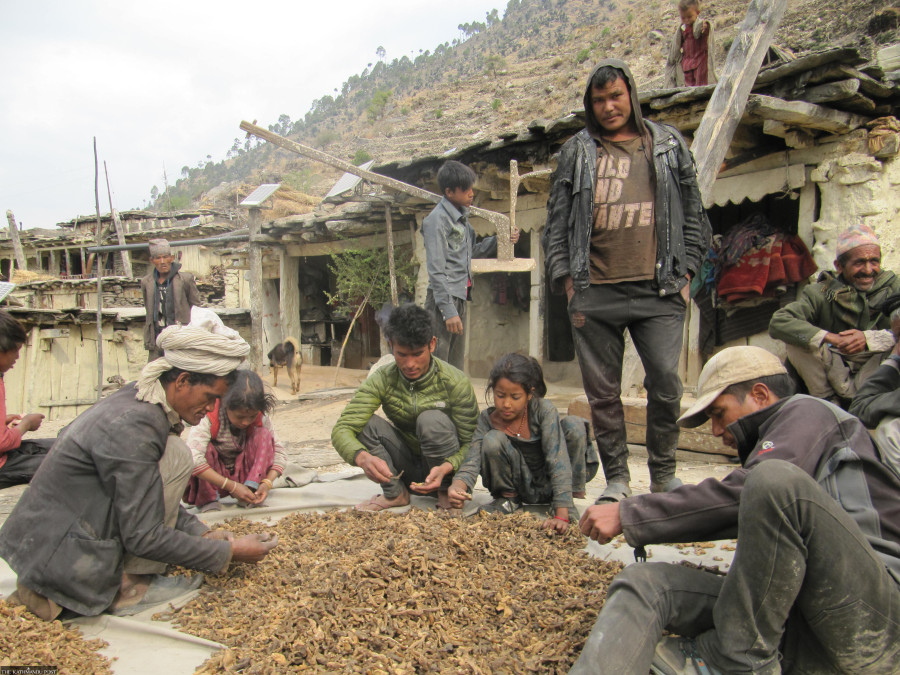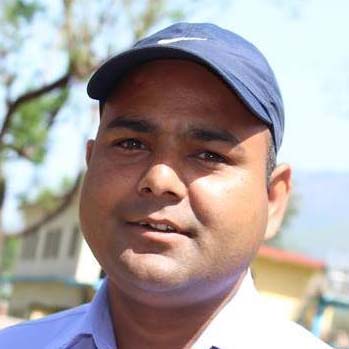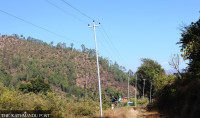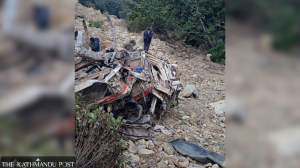Karnali Province
In Karnali highlands, harvesting medicinal herbs is the way of life and source of livelihood
But people worry their ancestral occupation might come to a crossroads as the new generation is attracted to city life.
Krishna Prasad Gautam
Tsewang Gurung and his family spend a greater part of the year away from home collecting herbs in the highlands of Dolpa. The 44-year-old, a resident of Kirathang Shey Phoksundo Rural Municipality-3, and his family collect various herbs between May and November. Like the Gurung family’s, herb collection is the mainstay of the residents of Kirathang, a village of 150 households.
The villagers eke out a living by collecting Yarsagumba (Ophiocordyceps sinensis) from May to July, Katuki (Picrorhiza kurroa) from August to October and Bholte, guchi chyau (Morchella esculenta) and wild garlic (Allium wallichii) in October-November.
Given the harsh topography of the mountain district, the villagers do not have agricultural pursuits. The Gurung family sows barley on the seven ropani of land it owns, but the yield is minimal, says Tsewang.
“The food we grow lasts us less than three months. Our village is in a very remote area with no amenities, but we have been living here for generations and will continue to do so as long as there are herbs,” said Tsewang. “Medicinal herbs have helped us sustain our livelihood. Going to the highlands to collect herbs is a way of life for us.”
But not every visit to the highlands results in good returns or expected sales.
“The journey to and the stay in the highlands is difficult. This year’s yarsagumba harvest wasn’t very good. Traders also did not reach the highlands to purchase yarsagumba. We didn’t make as much money as we were hoping from yarsagumba sales this year,” said Tsewang.
Tsewang is currently in Surkhet going from house to house selling yarsagumba at Rs300 per piece. He managed to collect half a kilogram of the precious herb this season. “We spent around Rs50,000 on our journey to the highlands this season, but we have so far earned only around Rs150,000 which is not enough for my family to live on until the next harvest season.”
Several settlements like Kirathang in the high altitude places of Karnali Province are entirely dependent on harvesting medicinal herbs for livelihood. Agricultural production is quite nominal, climate is harsh and development infrastructure are yet to reach the area. But despite the challenges, the villagers prefer to stay in the area for medicinal herbs.
“Our settlement is geographically very remote. The land is covered with snow for almost six months. We don’t have modern amenities like roads, telephone, health posts, or schools in the village. Life is difficult here. But we stay in the village hoping to make a living through herb collection,” said Tashi Lama of Mugumakarmarong Rural Municipality-2.
Tashi’s family stays in the settlement for about seven months. His family’s main source of income is medicinal herbs. “The highlands are rich with a variety of medicinal herbs. It’s not only yarsagumba we can collect. The demand for herbs is increasing in the market, so we might just be able to protect our way of life in the mountains,” he said. “Although the cities have their own advantages and rural areas have their own disadvantages, we don’t want to leave our ancestral land.”
According to him, there are around 150 households in his settlement. Every household makes a living collecting herbs like Yarsagumba, Katuki, Bholt and Ban-lasun.
Bhuten Tundup Lama of Taksi in Dolpobuddha Rural Municipality-3, Dolpa, is now in Surkhet to find a market for the Yarsagumba he and his family members collected this season. His family managed to collect around 500 pieces of Yarsagumba. Bhuten hopes to sell every piece of the herb before he returns to his village.
Sheyphoksundo and Dolpobuddha are two high-altitude local units in Dolpa, the country’s largest district in terms of area. The locals of both the rural municipalities have to come to Dunai, the district headquarters, after a three-day long journey on foot. “Despite the hardships, we don’t want to leave the village because the mountains look after us. They provide us with the opportunity to identify, collect and sell herbs so that we can make a living,” said Bhuten.
The rural folks of Mugu have a similar story to tell. “There are 18 settlements in our rural municipality which are totally dependent on herb collection for their livelihood,” said Tsering Kyapne Lama, the chairman of Mugamkarmarong Rural Municipality in Mugu. “The locals do not have any job or occupation. The local production is hardly enough for about three months. The jadibutis (medicinal herbs) fulfil their needs,” he added.
According to Tsering Kyapne, the traders reach the highlands and purchase herbs at good prices—Rs 1,650 per kg Katuki, Rs 550 per kg Bholte, and Rs 15,000 to 17,000 per kg Guchi chyau (mushroom). He, however, is concerned with the declining production of medicinal herbs in recent years.
According to the data available at the Directorate of Province Forest in Birendranagar, around 11,700 metric tonnes of various medicinal herbs were exported from Karnali Province in the last fiscal year of 2021-22. According to the directorate, 79 different medicinal herbs including Yarasabumba, Guchi Chyau, Rato Chyau, Satuwa, Atis, Nirmasi, Kutaki are found in all 10 districts of Karnali. The herb business provides jobs to around 50,000 individuals every year in Karnali, surmises assistant forest officer at the directorate Nabaraj Paudel.
The Ministry of Industry, Tourism, Forest and Environment in Karnali Province says that the ministry collected around Rs30 million in revenue by exporting herbs from the province.
Mountain herbs have been providing the locals with a livelihood, but the locals worry that with the newer generation moving to the cities, their ancestral occupation might come to a crossroads where the children have to choose between their forefathers' way of life and the modern world.
“Most people send their children to Kathmandu for education since there are no schools in the villages. The children may prefer to stay in the cities when they grow up and I worry that will be the end of our way of life in the mountains,” said Bhuten from Taksi.




 13.12°C Kathmandu
13.12°C Kathmandu












